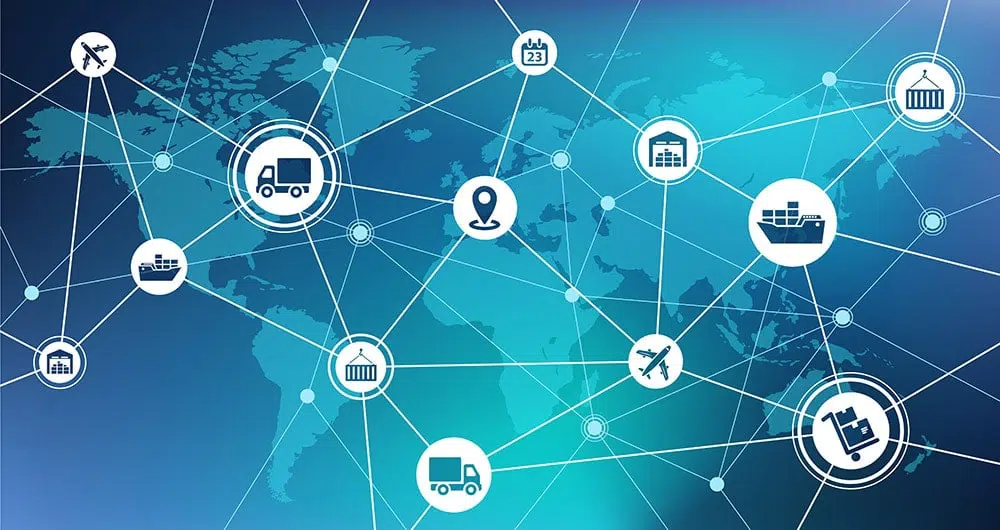Supply chain management
According to recent statistics, the supply chain management blockchain industry is projected to reach an expected to grow USD 4,936.05 million, with a rise of 52.21% from 2022 to 2027.
Why is the statistic expected at this rate of growth??????? More cargo theft, more complex shipping requirements, and the expanding e-commerce industry are some of the factors driving this expected growth.
Supply chain management is changing as a result of blockchain technology, which is also strengthening security and simplifying procedures for more efficiency and transparency. All parties involved are benefitting from these improvements, which are encouraging a clearer and safer method of managing products and services.
Blockchain enhancing the Supply chain management system
Blockchain technology in the supply chain guarantees effective licensing and ownership by using smart contracts to assure accurate licensing of services, software, and items. It creates agreement, prevents transaction disagreements, and ensures a consistent ledger version across all participants to monitor ownership data. Implementing blockchain technology in supply chain management simplifies procedures and improves visibility, providing advantages to several sectors.
You may have a thorough understanding of the whole integration process of blockchain in the supply chain by referring to the following graphic.
Key Features of Blockchain Enhancing Supply-Chain Management?
| Transparency | Blockchain establishes an unchangeable record of transactions that all involved parties can view and confirm, guaranteeing immediate data transparency and minimizing disagreements and mistakes. |
| Traceability | Blockchain systematically records every step of the supply chain, providing a detailed history of a product’s journey and facilitating the monitoring of its origins and movements to help spot problems. |
| Security | The decentralized and encrypted nature of the technology improves security, making it very difficult for unauthorized alterations or deletions of data to occur, hence reducing the likelihood of fraud and data breaches. |
| Smart Contracts | Automating procedures like payments, quality checks, and customs clearance in the supply chain enhances efficiency by reducing the reliance on middlemen and simplifying the process. |
| Real-time Monitoring | Coupling IoT with blockchain allows for immediate tracking of product parameters like temperature and humidity throughout transit, ensuring product quality and safety. |
| Compliance and Regulations | Blockchain enables adherence to industry norms and standards, simplifying the demonstration of compliance with legal obligations. |
Use cases of blockchain in chain supply management
Undoubtedly, blockchain is increasingly establishing a presence in the supply chain industry. Here are some primary applications of blockchain in supply chain management:
- Management
Blockchain improves supply chain management by increasing transparency, traceability, and security. It offers a common, unchangeable record, minimizing the chances of fraud, inaccuracies in data, and doubts. Smart contracts automate procedures, making companies more efficient. IoT enables real-time data monitoring to guarantee product quality. Blockchain’s characteristics enhance the dependability and effectiveness of supply networks.
- Product Recall
Blockchain streamlines supply chain product recalls by improving traceability and transparency, facilitating rapid identification and reducing costs and time required for the procedure.
- Ethical Standards
An increasing number of customers value ethical behaviors when selecting companies, with 60% investigating a company’s sustainability and ESG (Environmental, Social, and Governance) programs before buying. Blockchain traceability provides a dependable means for confirming the ethical source of products, allowing customers to track the origins and manufacturing processes of their purchases.
- Logistics
We discussed using smart contracts in blockchain technology. These smart contracts have the ability to independently validate, document, and manage transactions, removing the need for intermediaries.
This technology provides a solution to some complications linked to global supply networks. Logistics companies like DHL are investigating the use of blockchain technology in their activities.
- Supplier Payments
Payment mechanisms are an essential component of this system. Blockchain facilitates self-regulating, verified processes via smart contracts, which accelerates supplier payments and decreases the need for middlemen provided certain criteria are fulfilled.
The limitations of Blockchain Implementation in the Supply chain management Sector
Blockchain has the potential to transform supply chain management, but it is essential to recognize its current limitations.
- The preference for permissioned blockchains, potentially leading to less security due to fewer nodes.
- Human errors can result in false or fraudulent data on the blockchain.
- Transaction processing is slower, with transaction fees posing scalability challenges.
- Initial costs for specialized developers, planning, licensing, and maintenance can be substantial.
Can we consider a strong Future of Supply chain management with blockchain technology?
Yeah! We expect a strong future for supply chain management with the use of blockchain technology. The outlook for blockchain in supply chain management is favorable. With the advancement of technology and the growing use of blockchain solutions by organizations, we anticipate a rise in transparency, traceability, and security within supply chains. Smart contracts will automate several procedures, decreasing both delays and expenses.
